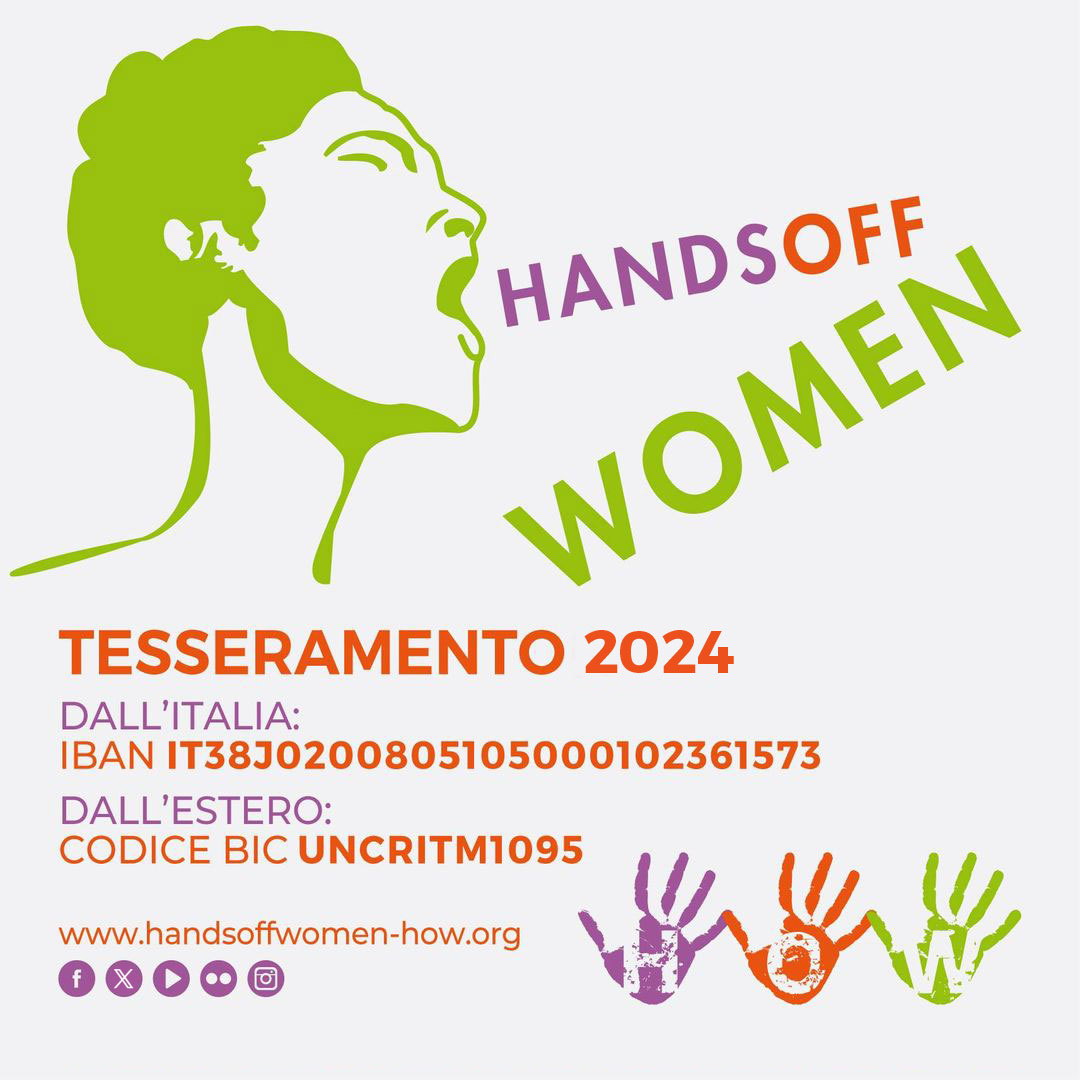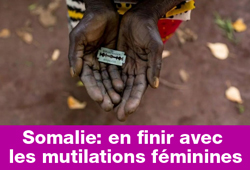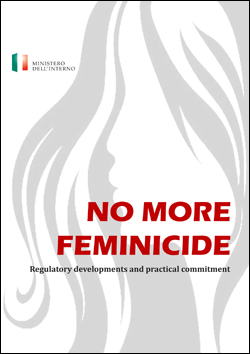by Barbie Latza Nadeau
Amid social change, domestic homicides are on the rise.
‘GIULIANA.” 46. who does not want to give her real name for her own safety has been hiding in a shelter for battered women in a dingy Roman suburb since July. when her husband tried to kill her with a 12 inch kitchen knife. She received more than 50 stitches on her hands from trying to fight off the attack. She miraculously escaped when a neighbor heard her screams and called the police. Her body gives testimony to more than 20 years of hell. bier arms are scarred from the cigarettes her husband extinguished on her bare skin. Her nose Is twisted from being broken three times. She is missing a toenail from when he ground her foot into the marble floor with his work boot. But despite all her visible cicatrices. her internal scars are worse. She is insecure and terrified he will find her and finish her off. He is waiting for me out there,” she says, chain-smoking nervously. “I can’t go back home now because he will kill me for running away.” Like 90 percent of Italian victims of domestic violence, Giullana has refused to press charges out of fear of retaliation. But Giuliana is lucky to be alive. Vanessa Scialfa, 20. made a fatal mistake last spring when she accidentally called her 34-year-old boyfriend. Francesco Lo Presti, by the wrong name. In a tit of jeal ous rage. he took the cord from the DVD player and strangled her to death in their home in Sicily. A few days later in Milan. Raffaele Fratantonlo beat up his 64 year old wife, Leda Corbelli. then doused her with gasoline before setting her alight because she went shopping without ask ing permission. The following week in Turin, Alfina Grande, 44, was thrown off a top-floor balcony by her boyfriend after arguing about what to watch on television. A month later near Naples, Carmela Imudi, 52. was shot with a Beretta 7.65 in the stomach when she asked her husband for a separation after years of his abuse. for which she had been hospitalized with broken ribs, a broken nose, and fractured wrists. Around the same time near Rome. Annamarla Pinto. 50, was shot in the head with a Smith if Wesson by her husband who thought she was spending too much time in church with a women’s group- he thought they were making her question his authority. Outside Milan. Antonia Bianco was beaten senseless and then stabbed through the heart with her own stiletto heel by her ex-boyfriend after he discovered she had found a new lover. Since Jan. 1, at least 100 women have been killed in Italy by men who once loved them. The figure breaks down to a *** chilling average: one woman is murdered every other day. Femlcide in Italy has been increasing by around 10 percent a year for the past three years faster than any other European country, according to Non Siamo Complici, or We Are Not Accomplices, a group that is working to empower women to stand up to domestic violence. Nearly 70 percent of the women were killed by men they lived with most of the rest were killed by former boyfriends and ex-husbands: a tiny fraction were killed by their own sons or strangers. But it is not a manifestation of strength that is behind the growing number of casualties. It is a manifestation of weakness as men come to terms with a societal change in which women are finally rising to positions of power, Giorgia Serughetti, a doctor of cultural studies who helped form the women’s empowerment group Se Non Ora Quando? (If Not Now When?) says some men fear that the women they once considered as posses sions will feel empowered by seeing examples of strong women around them. “This violence is because of the profound changes this country is going through regarding the roles of women in society,” Serughetti told Newsweek. “It’s because of women’s liberation.” To be fair, Italy 1s a country often unfairly shackled to its stereotypes, and the hot blooded Latin lover often gets blamed beyond his due. Changes In the law have also played a role in the increasing statistics. In part. new legislation has made violent acts once considered crimes of passion easier to prosecute as standard homicides, which means the numbers finally reflect what is really happening In the country. To put things in context. Italy is a country where domestic rape was not considered a crime until 1996. Even five years ago. most men who killed in a “raptus,” seized by a tit of jealous rage, were often forgiven In the eyes of the law and the women’s deaths treated as domestic “accidents.” Laws may make It easier to prosecute femicides. but they clearly don’t protect women from harm. That will only come from the epic task of changing the country’s mentality. Lorella Zanardo has made a huge impact in Italian society with her shock doc Corpo delle Donne (Body of a Woman) and her recent book Senza Chiedere it Permesso (Without Asking Permission) about how the oversexualization of women in the media is de stroying the society. She believes that as women are increasingly viewed as role models and portrayed on television and in the media in the boardrooms instead of the bedrooms, men fear their own wives, girlfriends, and even mothers will start getting ideas, too. “This increase is be cause of the inability of men to accept that we are standing before an epochal change in this country This means that after mil lennia in which women had a subordinate and inferior role, today women are taking decision-making roles both within the family and in organizations,” she told Newsweek. “It’s not easy for men: until now it has been enough to just be male to ensure that they would find a woman or two who only had one wish: to be married. Now men are faced with having to respect and relate to women, and to listen. And It’s not easy for them.” Serughetti says. “The inability to accept that the girlfriend, wife, lover, mother of their children has a mind of their own triggers the murderous rampage that would be very simplistic and misleading to call excess of love. jealousy; or insanity•. But It’s actually Insecurity:” When Gabriela Moscatelli opened the domestic violence hotline l’elefona Rosa 25 years ago, she says almost no one called. “‘they kept the dirty laundry of domestic violence within the walls of the home,” she told Newsweek. Now the center counsels close to 1,200 women a year who are in chronically abusive situations, helping them get into safer settings that didn’t exist a quarter century ago. Still, the numbers are worrying. Italy’s national statistical agency. ISTAT, esti mates that one in three women between Changes In the law have made it easier to prosecute ‘crimes of passion.” Indeed, women in Italy have long suffered from a misguided perception that they are not equal to men, enforced by dominant fathers, husbands, and even sons and hacked up by some of the most sexist primetime television on air anywhere in the world. But things are im proving quickly. And as the perception changes and women finally start feeling self-worth and self-confidence in their relationships, the gap widens because men aren’t being reeducated as quickly, and that’s when the trouble begins. “When a woman says no, and takes away that security that she will be there forever. the self image of the man falls apart.” the ages of 16 and 70 In Italy are victims of chronic domestic violence. Moscatelli says she sees a direct connection between how women are perceived publicly and how they are treated privately, and sometimes it is even the women who are high achieving outside the home who pay the biggest price when they get home. “When a man considers a woman his object and she suddenly rebels and challenges him or does not accept what he says, there is an escalation of emotion that leads to the violence,” Moscatelli told Newsweek And it is just one short step from escalated violence to femicide. And by then it’s too late.”
Newsweek – Italy’s Stiletto Murders
[File pdf - 968 Kb]




 FIRMA LA PETIZIONE
FIRMA LA PETIZIONE








Stay Connected